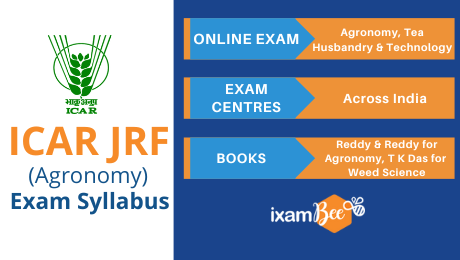- Details
- Ask Us?
ICAR JRF (Agronomy) Exam Pattern and Syllabus 2025

National Testing Agency (NTA), an independent autonomous and self-sustained premier testing organization under Society Registration Act, 1860 is going to conduct the ICAR JRF 2025 exam soon. The ICAR JRF exam pattern comprises subjects related to the stream you have applied for. The ICAR AIEEA PG selection process comprises-
- Online Test (Computer Based Test)
- Online Counselling
Please note that candidates declared eligible for registration and choice filling for online counseling by ICAR will only be considered for allocation of subject and the Agricultural University.
Once you have gone through the ICAR AIEEA PG exam pattern 2025, the next step is to go through the ICAR JRF (Agronomy) syllabus 2025. Going through the syllabus beforehand will enable you to plan your schedule in a way that will not only help you in covering all the topics in time but also leave plenty of room for a thorough revision. Once you are well-versed with the complete syllabus of ICAR AIEEA PG 2025, keep a list of study material with you for fruitful preparation for the exam
ICAR AIEEA PG (Agronomy) Online Test Exam Pattern (CBT) 2025
ICAR JRF Agronomy exam 2025 will be a single paper of 480 marks. The paper will be a computer based test and you will be given a total of 120 minutes to solve the entire paper. In the Agronomy paper, you will be asked from the sub subjects Agronomy and Tea Husbandry & Technology. Candidates will have the option to change previously saved answers of any question, anytime during the entire duration of the test. Detailed ICAR JRF Agronomy exam pattern 2025 has been provided below.
| Mode of Examination | No. of Questions | Maximum Marks | Duration | Exam Language | Questions Type |
|---|---|---|---|---|---|
| CBT (Computer Based Test) | 120 questions | 480 marks | 2 hours | English Only | Multiple Choice Questions |
ICAR AIEEA PG (Agronomy) Syllabus 2025
Make sure that you are well aware of the subjects for the exam. ICAR AIEEA PG Syllabus 2025 for Agronomy comprises two sub subjects i.e. (1) Agronomy (2) Tea Husbandry & Technology. There are a total of 09 units which are given in the ICAR website in detail. For detailed ICAR AIEEA PG Syllabus 2025, please look at the table below.
| Agronomy | |
|---|---|
| Sub-Subjects: Agronomy, Tea Husbandry & Technology | |
| Unit | Topics |
| Unit-1 | General: Importance of Agriculture in National Economy; Basic Principles of Crop Production; Cultivation of Rice, Wheat, Chickpea, Pigeon-pea, Sugarcane, Groundnut, Rapeseed and Mustard, Potato. Major Soils of India, Role of NPK and their Deficiency Symptoms. Structure and Function of Cell Organelles; Mitosis and Meiosis; Mendelian Genetics: Elementary Knowledge of Photosynthesis; Respiration, Photorespiration and Transpiration; Structure and Functions of Carbohydrates, Proteins, Nucleic Acids, Enzymes and Vitamins. Major Pests and Diseases of Rice, Wheat, Cotton, Chickpea, Sugarcane and their Management. Important Rural Development Programmes in India; Organisational Set Up of Agricultural Research, Education and Extension in India; Elements of Statistics. |
| Unit-2 | Principles of Agronomy, Crop Ecology and Geography and Agricultural Meteorology: Agronomy –meaning and Scope, National & International Agricultural Research Institutes in India, Agro Climatic Zones of India, Tillage, Crop Stand Establishment and Planting Geometry and their Effect On Crop, Physiological Limits of Crop Yield and Variability In Relation To Ecological Optima, Organic Farming, Precision Farming, Integrated Farming Systems, Principles of Field Experimentation. Principles of Crop Ecology and Crop Adaptation, Climate Shift and Its Ecological Implications, Agro- Ecological Regions in India, Geographical Distribution of Crop Plants, Greenhouse Effect, Climatic Factors and their Effect On Plant Processes and Crop Productivity, Role of GIS and GPS in Agriculture. Weather & Climate, Earth’s Atmosphere, Solar Radiation, Atmospheric Temperature and Global Warming. Crops and Atmospheric Humidity, Weather Forecasting. |
| Unit-3 | Field Crops: Origin, Distribution, Economic Importance, Soil and Climatic Requirement, Varieties, Cultural Practices and Yield of Cereals ( Rice, Wheat, Maize, Sorghum, Pearl Millet, Minor Millets, Barley), Pulses (Chickpea, Lentil, Peas, Pigeon Pea, Mungbean, Urdbean), Oilseeds (Groundnut, Sesame, Soybean, Rapeseed & Mustard, Sunflower, Safflower, Linseed), Fiber Crops (Cotton, Jute, Sun Hemp), Sugar Crops (Sugarcane), Fodder & Forage Crops (Sorghum, Maize, Napier, Berseem, Lucerne, Oats), Medicinal & Aromatic Plants (Menthe, Lemon Grass and Isabgol) and Commercial Crops(Potato, Tobacco). |
| Unit-4 | Weed Management: Principles of Weed Management, Classification, Biology and Ecology of Weeds, Crop Weed Competition and Allelopathy, Concepts and Methods of Weed Control, Integrated Weed Management, Classification, Formulations, Selectivity and Resistance of Herbicides, Herbicide Persistence in Soil and Plants, Application Methods and Equipments, Weed Flora Shifts in Cropping Systems, Special and Problematic Weeds and their Management in Cropped and Non-cropped Situations, Weed Management in Field Crops. |
| Unit-5 | Water Management: Principles of Irrigation, Water Resources and Irrigation Development in India, Water And Irrigation Requirements, Concepts and Approaches of Irrigation Scheduling, Methods of Irrigation, Measurement of Irrigation Water, Application, Distribution and Use Efficiencies, Conjunctive Use of Water, Irrigation Water Quality and Its Management, Water Management in Major Field, Crops (Rice, Wheat, Maize, Groundnut, Sugarcane) Agricultural Drainage. |
| Unit-6 | Soil Fertility and Fertilizer Use: Essential Plant Nutrients and their Deficiency Symptoms, Concept of Essentiality of Plant Nutrients, Indicators of Soil Fertility and Productivity, Fertilizer Materials and their Availability To Plants, Slow Release Fertilizers, Nitrification Inhibitors, Principles and Methods of Fertilizer Application, Integrated Nutrient Management, Site Specific Nutrient Management. |
| Unit-7 | Dryland Agronomy: Characteristics of Dryland Farming and Delineation of Dryland Tracts, Constraints of Dryland Farming in India, Types of Drought and their Management, Contingency Crop Planning and Mid- Season Corrections For Aberrant Weather and Its Recycling. Watershed Management. |
| Unit-8 | Problem Soils: Problem Soils and their Distribution in India, Characteristics and Reclamation of These Soils, Crop Production Techniques in Problem Soils. |
| Unit-9 | Sustainable Land Use Systems: Sustainable Agriculture: Parameters and Indicators, Conservation Agriculture, Safe Disposal of Agri-industrial Waste For Crop Production, Agro-forestry Systems, Shifting Cultivation, Alternate Land Use Systems, Wastelands and their Remediation For Crop Production. |
Online Counselling
After the marks and rank will be declared, eligible candidates will be given a choice of opting subject and the Agricultural University. The ICAR AIEEA PG counseling schedule will be notified by ICAR separately after declaration of result. Please note that the scholarship as well as admission will be granted only when the candidate seeks admission through counseling conducted by ICAR AIEEA (PG) --cy–.
Marking Scheme
ICAR AIEEA PG will have multiple choice types of questions. You will be asked 120 questions and each question is of 4 marks. For every wrong answer marked, 1 mark will be deducted. The marking scheme for ICAR AIEEA PG 2025 and the penalty for wrong answers are as follows.
| Marking Scheme | Considered Marks |
|---|---|
| For correct answers | 4 marks |
| For wrong answers | -1 mark |
| For not attempted | 0 (no marks) |
Exam Language
ICAR AIEEA exam will be conducted online. Kindly note that all questions in ICAR AIEEA PG 2025 Agronomy exam will be in English language only. No other medium will be available to answer the questions.
Normalization Procedure based on Percentile Score
In order to overcome disparity between the candidates attempting hard shift and easy shift paper, “Normalization procedure based on Percentile Score” will be used for ensuring that candidates are neither benefited nor disadvantaged due to the difficulty level of the examination.
The Percentile score of a Candidate is calculated as follows:
100 X Number of candidates appeared in the ‘Session’ with raw score EQUAL TO OR LESS than the candidate / Total number of the candidates appeared in the ’Session’
In this procedure, marks obtained are transformed into a scale ranging from 100 to 0 for each session of examinees. The Percentile Score indicates the percentage of candidates that have scored EQUAL TO OR BELOW (same or lower raw scores) that particular Percentile in that examination. Therefore the topper (highest score) of each session will get the same Percentile of 100 which is desirable. The marks obtained in between the highest and lowest scores are also converted to appropriate Percentiles. The Percentile score will be the Normalized Score for the examination (instead of the raw marks of the candidate) and shall be used for preparation of the merit lists. The Percentile Scores will be calculated up to 7 decimal places to avoid the bunching effect and reduce ties.
Important Books
While preparing for any examination, please make sure that you are referring to useful books/study material. It is advised to give a subsequent amount of time in researching and finalizing the books before starting your preparation. To help you with the preparation, we are providing some ICAR AIEEA PG Agronomy books which can be useful for the ICAR AIEEA PG Agronomy exam.
| Books | Author |
|---|---|
| Principles of Agronomy | Reddy and Reddy |
| Principles of Crop Production | S R Reddy |
| Irrigation Agronomy | Reddy |
| Weed Science | T K Das |
| Field Crops (Vol. 1 and Vol.2) | Rajendra Prasad |
| Crop Nutrition | Rajendra Prasad |
| Objective Agronomy | Thavaprakash |
| Agronomy Facts (Short Notes) | Sihag and Meena |
| Agronomy (Objective) | Treatise Agriwizard |
| Objective Agriculture | C R Reddy |
Free Mock Tests
A good preparation strategy should always be accompanied by enough practice to let all your knowledge and learning stay for a longer time. ixamBee provides ICAR JRF Agronomy free mock tests that will give you an opportunity to practice as much as you can and analyze your performance.
Online Course
Due to an increase in demand, ixamBee has launched an ICAR JRF Agronomy Online Course that has been curated by our experts keeping the latest pattern in mind. The course has everything that will lead you to the path of success. Join today and you will become one step closer to success.


